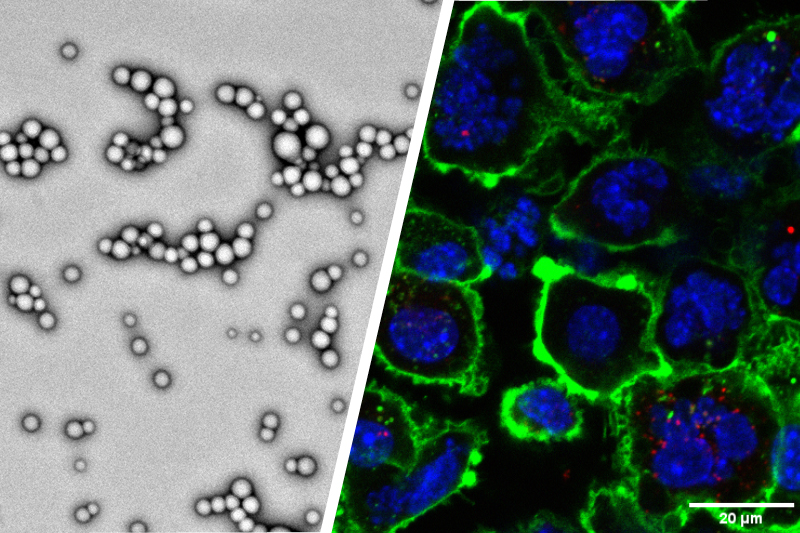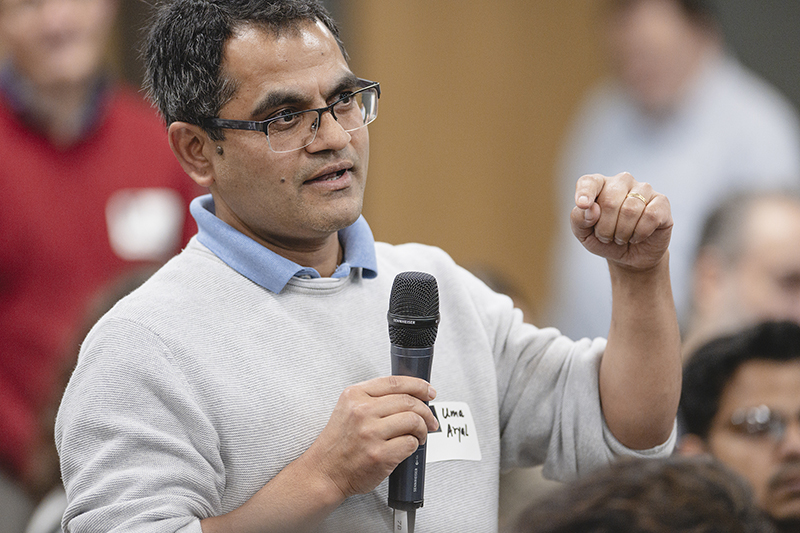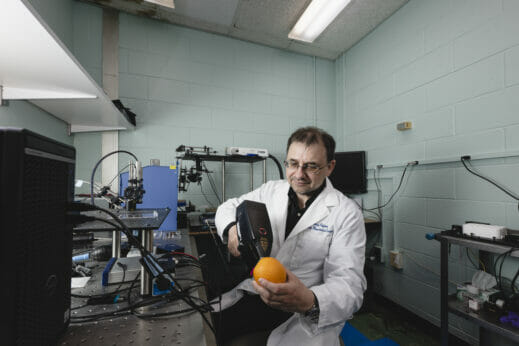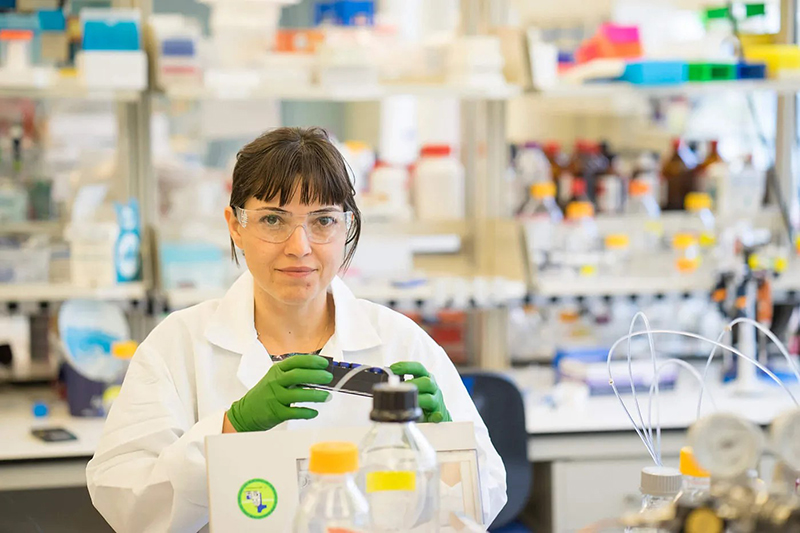Recent News
Purdue researchers create biocompatible nanoparticles to enhance systemic delivery of cancer immunotherapy

April 2, 2024
Purdue University researchers are developing and validating patent-pending poly (lactic-co-glycolic acid), or PLGA, nanoparticles modified with adenosine triphosphate, or ATP, to enhance immunotherapy effects against malignant tumors.
Purdue researchers create biocompatible nanoparticles to enhance systemic delivery of cancer immunotherapy
Life and Health Sciences Summit opens new opportunities for Purdue researchers

November 2, 2023
Nearly 130 Purdue faculty, staff and university leaders met in a Life and Health Sciences Summit on Oct. 19 to explore and define opportunities to deepen Purdue’s leadership in these fields. Ahead of the summit, faculty teams from seven colleges and 22 departments submitted 48 proposals for research topics where Purdue has unique, nationally leading strengths. Funding from a pool of up to $2 million was set aside to catalyze such faculty pursuits as part of a seed investment. “We received many submissions worthy of further exploration,” said Rams Subramanian, director of Bindley Bioscience Center. “Although only a few could be presented and discussed during the summit, our strong hope is that teams continue advancing their ideas.”
Life and Health Sciences Summit opens new opportunities for Purdue researchers
Using a Food’s Unique Fingerprint to Detect Fraud

October 31, 2023
Every food has a unique, and invisible, chemical “fingerprint.” A researcher from Purdue University has discovered a quick and portable way to identify that fingerprint and sniff out food fraud on the go. Let’s say there’s a food you suspect isn’t quite as advertised. Maybe that cheese that’s supposedly been aging for five years doesn’t have the right funk or the saffron you bought doesn’t seem the right shade of red. How would you go about testing it? What would that even look like? Chemically, we have the ability to detect these differences in foods. If you send it off to an analytical chemist, they can pop the suspect food in their mass spectrometer—worth about half a million dollars and the size of a large closet—and let you know fairly precisely if there’s anything fishy with your fish. That’s not so accessible for the average shopper. Bartek Rajwa, a professor of bioinformatics at Purdue University, kept this issue in mind when he started looking at ways to detect food fraud. Was there a system that was relatively affordable? Could he make it portable? Could he find a way to have more immediate results, instead of waiting for weeks in a traditional lab test? In a word: yes. But it took him more than a few tries. “Food is obviously a very complex matrix,” says Rajwa. “If we could reproducibly register some kind of a unique pattern associated with the specific product, then, in theory, that might help [identify fraud].” Rajwa began looking for the food’s “fingerprint,” as he called it; the unique atomic makeup that would tell him definitively which slice of ham came from pork that had been cured for years in a Portuguese cave and which slice of ham was just painted to look that way.
Purdue lipid biomarker panels perform real-time, point-of-care sample analysis in industrial and agricultural settings.

October 31, 2023
Christina Ferreira, metabolomics analyst at Purdue’s Metabolite Profiling Facility and Center for Analytical Instrument Development, has created a simple workflow to deliver biological samples to a mass spectrometer to provide real-time data analysis without performing liquid chromatography.
Purdue lipid biomarker panels perform real-time, point-of-care sample analysis in industrial and agricultural settings.
National Institutes of Health grant funds interdisciplinary stem cell research
February 23, 2023
A team of Purdue University scientists led by Shihuan Kuang has received a $2.5 million grant from the National Institutes of Health to define the role of lipid droplets in muscle stem cell function, a study with implications in both humans and livestock. Working with Kuang on the project are Christina Ferreira, a developmental biologist with training in analytical chemistry in the Bindley Bioscience Center; James Markworth, assistant professor of animal sciences; and Chi Zhang, assistant professor of chemistry in the College of Science.
Read More about "National Institutes of Health grant funds interdisciplinary stem cell research"
Susan McCreery recipient of a Thumbs Up in Purdue Today
February 13, 2023
Susan McCreery (Bindley Bioscience Center): Susan is a great colleague whose dedication and hard work is truly inspiring to others. She is always available to help others and contributes every day to make Bindley Bioscience Center a better place to work. She goes above and beyond to help other colleagues when needed, even after hours or during the weekend. When one of us is under pressure or having problems, Susan always steps in to help, regardless of her workload. Thank you, Susan, for your tremendous support. A big thank you from the bottom of our hearts. – Uma Aryal (Comparative Pathobiology)
Read More about "Susan McCreery recipient of a Thumbs Up in Purdue Today"
Daniel Fan recipient of a Thumbs Up in Purdue Today
February 13, 2023
Daniel Fan (Bindley Bioscience Center): Continuous help with computer issues! Thank you so much! – Viktoria Krasnyanskaya (Bindley Bioscience Center)
Read More about "Daniel Fan recipient of a Thumbs Up in Purdue Today"
Prostate Cancer- associated urinary proteomes differ before and ager prostatectomy: Therapeutics Advances in Medical Oncology
January 31, 2023
Dr. Yokota's group at the Department of Biomedical Engineering, Indiana University Purdue University (IUPUI) and the Purdue Proteomics Facility in Bindley Bioscience Center have published their collaborative research on "Prostate Cancer-associated urinary proteome before and after prostatectomy" in the journal "Therapeutic Advances in Medical Oncology ". This study shows remarkable alteration of urinary proteome, and the post-prostatectomy urine provides tumor-suppressive proteomes and demonstrates the dynamic nature of urinary proteome as a strategy for predicting tumor suppressors.
Prostate Cancer- associated urinary proteomes differ before and ager prostatectomy: Therapeutics Advances in Medical Oncology
Proteomic analysis of canine vaccines in: American Journal of Veterinary Research
January 24, 2023
Proteomic analysis of canine vaccines" has been published in the American Veterinary Medical Association (AVMA) that identifies mammalian proteins in commercial veterinary vaccines against canine distemper, leptospirosi, borreliosis, and rabies. This is a result of collaboration between scientists at the Purdue Proteomics Facility in Bindley Bioscience Center and Purdue College of Veterinary Medicine.
Proteomic analysis of canine vaccines in: American Journal of Veterinary Research
Membrane lipid changes in mice blastocysts induced by ovarian stimulation, IVF, and oocyte vitrification
January 17, 2023
We thank the Metabolite Profiling Facility, Bindley Bioscience Center, Purdue University, especially Dr. Christina Ramires Ferreira for performing the Lipid profiling analysis.
